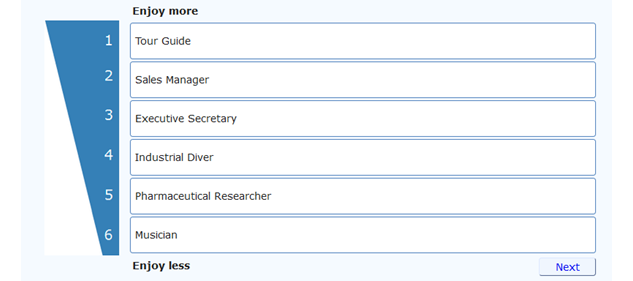Interest-Questionnaire following RIASEC

Interest-Map™ is a questionnaire based on Dr. John Holland's Theory of Career Choice.
It was developed in 1977, has a strong scientific background and is still used for studies and research. It is the most known and examined model regarding the topic of career choice.
The model is based on the observation that mankind feels attracted and satisfied in jobs and tasks that match their preferences and inclinations. Such jobs can be classified through the personalities seeking for specific fulfillment.
An individual's preferences express intrinsic motivations for a certain task or job as well as certain jobs attract a certain type of person.
Dr. John Holland's biggest contribution to science was the development of a taxonomy classifiying both, the jobs as well as the personalities. He defined six categories to describe concordance in between a person a job:
Realistic,
Investigative or researching,
Artistic,
Sociale,
Enterprising and
Conventional.
Utility
- Personal interests are compared with the individual conditions of an educational program or an apprenticeship. This leads to an useful orientation.
- Even if a concrete idea of the personal and/or professional future already exists, the result of the test can serve as a confirmation or indicate the necessity to question a given plan.
Procedure
The Forced-Choice-Procedure (ipsativ) is being used. In the first part six jobs have to be put in an individual order, whereas the question is the following: 'Which job would bring you the highest amount of joy?'
For example:


In the second part, following the same principle, questions regarding the preferred task are being asked.
In the end, both parts will be matched and - having honest responses - deliver valid statements regarding someone's preferences.